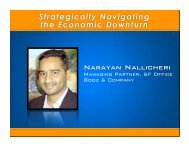PDF: 2962 pages, 5.2 MB - Bay Area Council Economic Institute
PDF: 2962 pages, 5.2 MB - Bay Area Council Economic Institute
PDF: 2962 pages, 5.2 MB - Bay Area Council Economic Institute
You also want an ePaper? Increase the reach of your titles
YUMPU automatically turns print PDFs into web optimized ePapers that Google loves.
Architecture/Urban Planning/Infrastructure<br />
Real estate investment trusts (REITs) floated in Singapore have become popular as a means for landholders<br />
to derive shorter-term returns on their assets in a market with a relatively low cost of capital.<br />
Recent investment has focused on equity stakes in listed or pre-IPO Indian property development<br />
firms rather than specific projects, since the Finance Ministry, Department of Industrial Policy and<br />
Promotion (DIPP) and the Securities and Exchange Board of India (SEBI) clarified rules for foreign<br />
institutional investors (FII) and foreign venture capital funds. To prevent speculation, foreign<br />
investment in development companies is treated as foreign direct investment (FDI) rather than<br />
portfolio investment, with minimum financial commitments and lock-in periods.<br />
Investment has concentrated on 22 realty firms, emphasizing development in housing, retail, and<br />
IT parks. Indian firms such as DLF Ltd., Unitech Ltd., and Oberoi Construction, which are already<br />
holding large portfolios of property bought earlier at favorable prices, are particularly attractive; so<br />
are developers with expertise and reach into Tier 2 and 3 cities. Banks such as HDFC and ICICI,<br />
that are active in the mortgage segment, have formed respective joint ventures with Citigroup and<br />
Portman Holdings, and with U.S. developer Tishman Speyer. Hong Kong, Singapore, Dubai, and<br />
European investors compete aggressively in the market.<br />
Non-resident Indians have more than $3 billion parked in tax-free rupee and foreign currency<br />
accounts with Indian banks. Gradually, as opportunities open up, they are shifting that money to<br />
equities, bonds and property. NRI ownership of non-agricultural property in India—through<br />
purchase, inheritance, or gift—is now allowed without restriction, with sale proceeds and rental<br />
income fully repatriable.<br />
India had a total 110,000 hotel rooms nationwide at the end of 2006, a comparable number to<br />
New York City and a tenth of the rooms available in China. The result—at least until the<br />
November 2008 terrorist attacks at two hotels in Mumbai and the current downturn—has been<br />
fully booked hotels in Delhi, Bangalore, and Mumbai, with rates of $500 per night or more not<br />
uncommon. Many hotels operated at higher than 100% capacity in 2008, at times checking one<br />
guest in within hours of checking another out, and charging both for the same day.<br />
The tourism ministry expects 140,000 more rooms to be added by 2010, although industry estimates<br />
are somewhat lower. Developers have pressed Indian Railways to privatize operation of its<br />
Yatri Niwas budget hotel chain and free up more of its large landholdings for new tourist-related<br />
development. They have also urged government to release more urban public land at auction, to<br />
ease prices in the market.<br />
Special economic zone (SEZ) development has been popular, especially as part of or in combination<br />
with planned communities that offer workers housing and amenities within walking distance<br />
of home. Since the Special <strong>Economic</strong> Zones Act took effect in February 2006, some 370 zones<br />
have been approved, nearly 260 of them related to IT services and software. The zones offer export-oriented<br />
tenants duty-free treatment for inputs, concessionary loans, and exemption from<br />
income, service, sales, and alternative minimum taxes. Developers receive exemption from customs/excise<br />
duties, income tax, alternative minimum tax, dividend distribution tax, central sales tax<br />
and service tax.<br />
165








